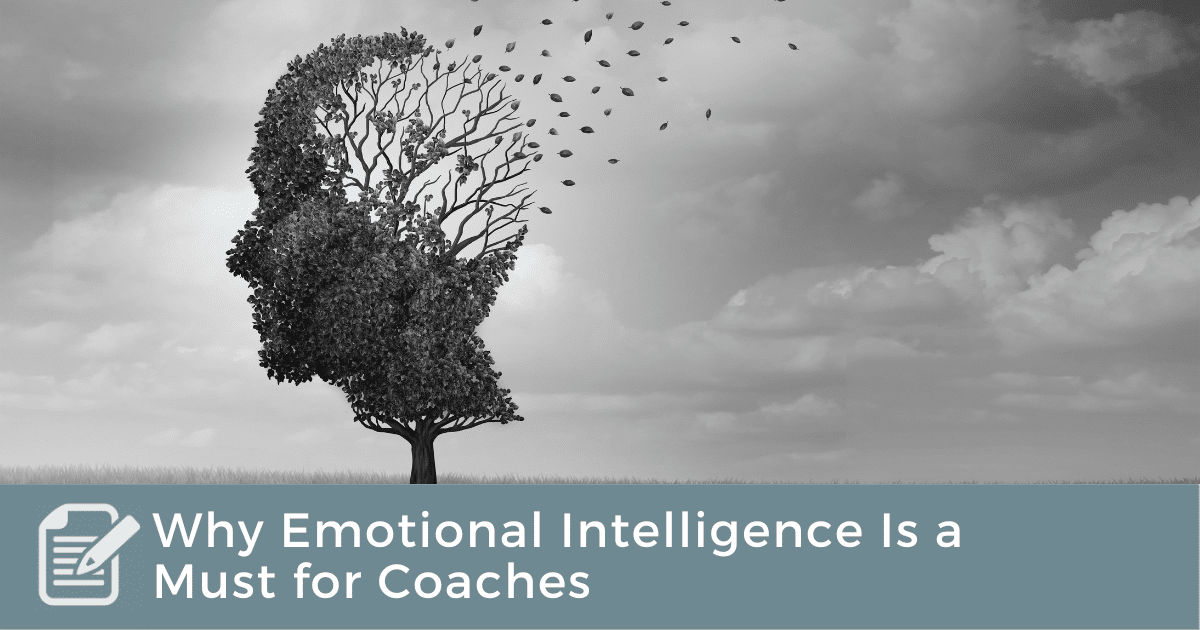
The topic of emotional intelligence has been around for decades now. It’s a simple, yet profound concept that describes the ability to recognize feelings (our own and those of other people), to manage our emotions and actions, and to wisely interact with other people.
The value of emotional intelligence is often most evident when someone lacks it. People with low emotional intelligence have and create problems at work, at home, and pretty much everywhere else. Low emotional intelligence makes it difficult for them to achieve goals, collaborate, work in a team, or lead others. Why? Because they are more likely to lose their temper, lash out at others, fail to read a room, be far too inconsiderate with their words and tone, and miss opportunities to strengthen trust.
As coaches, we need to not only know about emotional intelligence, we also need to practice it. In fact, I’d say that emotional intelligence (EI) is one of the cornerstones for being an effective coach. Here are five reasons why.
First, nobody wants an emotionally unstable coach. People with low EI fail to recognize what they are feeling and are far less likely to regulate how they express what they are feeling. A coaching session is about the client and the client’s agenda – NOT about the coach or what the coach is feeling. When we fail to recognize our emotions and we allow ourselves to express our emotions too strongly in a coaching session, we are taking value away from the client, we are taking focus off of the client, and we are failing to give the client that for which they have paid.
Second, coaches need empathy. EI includes the ability to notice what others are feeling and then adapt accordingly. This doesn’t mean coaches need the ability to read the client’s mind (or heart), but it does mean that we need to be able to understand our client’s perspectives so we can support them in evoking awareness, separating feeling, fact, and fiction, and make the coaching relationship a safe place for difficult and sometimes dangerous work.
Third, coaches need to be fluent in the language of emotions. Emotions are real. They matter. Sometimes they matter a great deal. When we develop our EI, we are much better equipped to tap into one of the most powerful factors in the life of any client: their feelings. Emotions are key for personal motivation, healthy relationships, healthy self-talk, confidence, and a host of other success factors. If we underestimate, ignore, and fail to leverage emotions, we withhold a powerful resource from our clients.
Fourth, we can support our client as they strengthen their EI. Since EI is so important to success in life, it makes sense that we would want to help our clients grow their EI. The more we see EI as an important aspect of life, and the more fluent we are in the principles of EI, the more likely and the more effective we will be at helping our clients grow more emotionally intelligent. We can directly share the EI framework and principles with our clients. We can also take a less direct approach and let the framework inform our coaching questions, our feedback, and the way we help our clients frame their issues.
Finally, we can practice EI in the relationship with our client to make the relationship stronger, more effective, and more successful. Our relationship with a client is, obviously, a relationship. EI describes the kind of awareness and behaviors that contribute to strong, purposeful relationships. So one of the most foundational applications of EI in coaching is for the coach to grow to be more emotionally intelligent, thus strengthening and supporting the coaching relationship.
So much of the success for any relationship is the degree of EI among the parties involved. Knowing about EI, boosting your own EI, and supporting your clients as they practice and strengthen their own EI is a recipe for client and coaching success!


